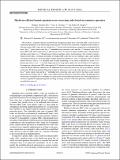Hardware-efficient bosonic quantum error-correcting codes based on symmetry operators
Author(s)
Niu, Yuezhen; Chuang, Isaac; Shapiro, Jeffrey H
DownloadPhysRevA.97.032323.pdf (685.5Kb)
PUBLISHER_POLICY
Publisher Policy
Article is made available in accordance with the publisher's policy and may be subject to US copyright law. Please refer to the publisher's site for terms of use.
Terms of use
Metadata
Show full item recordAbstract
We establish a symmetry-operator framework for designing quantum error-correcting (QEC) codes based on fundamental properties of the underlying system dynamics. Based on this framework, we propose three hardware-efficient bosonic QEC codes that are suitable for χ²-interaction based quantum computation in multimode Fock bases: the χ² parity-check code, the χ² embedded error-correcting code, and the χ² binomial code. All of these QEC codes detect photon-loss or photon-gain errors by means of photon-number parity measurements, and then correct them via χ² Hamiltonian evolutions and linear-optics transformations. Our symmetry-operator framework provides a systematic procedure for finding QEC codes that are not stabilizer codes, and it enables convenient extension of a given encoding to higher-dimensional qudit bases. The χ² binomial code is of special interest because, with m≤N identified from channel monitoring, it can correct m-photon-loss errors, or m-photon-gain errors, or (m−1)th-order dephasing errors using logical qudits that are encoded in O(N) photons. In comparison, other bosonic QEC codes require O(N²) photons to correct the same degree of bosonic errors. Such improved photon efficiency underscores the additional error-correction power that can be provided by channel monitoring. We develop quantum Hamming bounds for photon-loss errors in the code subspaces associated with the χ² parity-check code and the χ² embedded error-correcting code, and we prove that these codes saturate their respective bounds. Our χ² QEC codes exhibit hardware efficiency in that they address the principal error mechanisms and exploit the available physical interactions of the underlying hardware, thus reducing the physical resources required for implementing their encoding, decoding, and error-correction operations, and their universal encoded-basis gate sets.
Date issued
2018-03Department
Massachusetts Institute of Technology. Department of Electrical Engineering and Computer Science; Massachusetts Institute of Technology. Department of Physics; Massachusetts Institute of Technology. Research Laboratory of ElectronicsJournal
Physical Review A
Publisher
American Physical Society
Citation
Niu, Murphy Yuezhen et al. "Hardware-efficient bosonic quantum error-correcting codes based on symmetry operators." Physical Review A 97, 3 (March 2018): 032323 © 2018 American Physical Society
Version: Final published version
ISSN
2469-9926
2469-9934